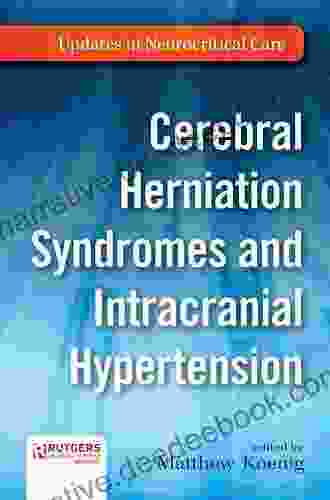Cerebral Herniation Syndromes and Intracranial Hypertension: Comprehensive Guide

4 out of 5
| Language | : | English |
| File size | : | 8984 KB |
| Text-to-Speech | : | Enabled |
| Screen Reader | : | Supported |
| Enhanced typesetting | : | Enabled |
| Print length | : | 249 pages |
Cerebral herniation and intracranial hypertension are critical neurosurgical emergencies that require prompt diagnosis and management to prevent irreversible neurological damage and even death. This comprehensive guide delves into the causes, pathophysiology, clinical manifestations, and management strategies for cerebral herniation syndromes and intracranial hypertension.
Types of Cerebral Herniation Syndromes
- Uncal Herniation: Occurs when the medial temporal lobe herniates through the incisura tentorii, compressing the midbrain and causing disruption of consciousness, pupillary abnormalities, and hemiparesis.
- Central Herniation: Also known as downward herniation, occurs when the diencephalon descends through the tentorial opening, resulting in brainstem compression and potentially causing respiratory arrest and death.
- Transtentorial Herniation: Involves the herniation of the frontal and parietal lobes over the tentorium cerebelli, causing lateral displacement of the brainstem and possible motor and sensory deficits, as well as altered consciousness.
- Tonsillar Herniation: Occurs when the cerebellar tonsils herniate through the foramen magnum into the cervical canal, compressing the brainstem and causing respiratory and cardiovascular compromise.
Causes of Intracranial Hypertension
Intracranial hypertension, a significant risk factor for cerebral herniation, can arise from various factors:
- Increased intracranial volume (e.g., brain tumors, hematomas, abscesses)
- Obstruction of cerebrospinal fluid (CSF) flow (e.g., hydrocephalus, CSF leak)
- Vasogenic edema (e.g., ischemic stroke, traumatic brain injury)
- Cytotoxic edema (e.g., cerebral ischemia, anoxia)
- Hypertensive encephalopathy
Clinical Manifestations
The clinical manifestations of cerebral herniation syndromes and intracranial hypertension vary depending on the type of herniation and the severity of the underlying condition. However, common symptoms include:
- Altered consciousness (ranging from drowsiness to coma)
- Headache
- Nausea and vomiting
- Pupillary abnormalities (e.g., anisocoria, fixed pupils)
- Motor and sensory deficits (e.g., hemiparesis, hemianopia)
- Respiratory and cardiovascular abnormalities
Management Strategies
The primary goal of management is to reduce intracranial pressure (ICP) and prevent further herniation. Treatment strategies include:
- Medical Management:
- Hyperosmolar therapy (e.g., mannitol, hypertonic saline)
- Diuretics (e.g., furosemide)
- ICP monitoring
- Sedation and analgesia
- Surgical Intervention:
- Lumbar puncture (therapeutic or diagnostic)
- Craniotomy for tumor resection, hematoma evacuation, or ventricular drainage
- Decompressive craniectomy
- Neuromonitoring: Continuous monitoring of ICP, cerebral perfusion pressure (CPP),and other vital signs to guide treatment decisions.
- Neuroimaging: Computed tomography (CT) and magnetic resonance imaging (MRI) provide essential information for diagnosis and treatment planning.
Research and Treatment Updates
Ongoing research focuses on improving management strategies for cerebral herniation syndromes and intracranial hypertension. Recent advances include:
- Development of non-invasive ICP monitoring techniques
- Investigation of novel pharmacological agents to reduce ICP
- Refinement of surgical techniques for decompressive procedures
- Early intervention using neuromonitoring to identify and treat ICP elevations before irreversible damage occurs
Cerebral herniation syndromes and intracranial hypertension are complex and potentially life-threatening conditions. Understanding the pathophysiology, clinical manifestations, and management strategies is crucial for neurosurgeons and other healthcare professionals involved in their care. Early diagnosis, prompt intervention, and ongoing research are essential to improve patient outcomes and prevent devastating neurological consequences.
4 out of 5
| Language | : | English |
| File size | : | 8984 KB |
| Text-to-Speech | : | Enabled |
| Screen Reader | : | Supported |
| Enhanced typesetting | : | Enabled |
| Print length | : | 249 pages |
Do you want to contribute by writing guest posts on this blog?
Please contact us and send us a resume of previous articles that you have written.
 Book
Book Page
Page Genre
Genre Paperback
Paperback Magazine
Magazine Newspaper
Newspaper Paragraph
Paragraph Sentence
Sentence Bookmark
Bookmark Shelf
Shelf Glossary
Glossary Foreword
Foreword Synopsis
Synopsis Annotation
Annotation Manuscript
Manuscript Scroll
Scroll Library card
Library card Narrative
Narrative Biography
Biography Autobiography
Autobiography Reference
Reference Encyclopedia
Encyclopedia Thesaurus
Thesaurus Narrator
Narrator Librarian
Librarian Catalog
Catalog Borrowing
Borrowing Periodicals
Periodicals Scholarly
Scholarly Reserve
Reserve Academic
Academic Rare Books
Rare Books Special Collections
Special Collections Interlibrary
Interlibrary Literacy
Literacy Dissertation
Dissertation Awards
Awards Book Club
Book Club Theory
Theory Textbooks
Textbooks Mei Yu
Mei Yu C W Task
C W Task Cathy Mcdavid
Cathy Mcdavid Priscilla Costello
Priscilla Costello Carrie Summers
Carrie Summers Knut Hamsun
Knut Hamsun Traci Hunter Abramson
Traci Hunter Abramson Alexander Heyne
Alexander Heyne Dan Fox
Dan Fox Helen Winter
Helen Winter Patti Sherlock
Patti Sherlock Gabrielle Danoux
Gabrielle Danoux Yvonne Jones
Yvonne Jones E T A Hoffmann
E T A Hoffmann Sayjai Thawornsupacharoen
Sayjai Thawornsupacharoen Andrew Young
Andrew Young Michael Heatley
Michael Heatley William Ferrara
William Ferrara Frederik Van Passel
Frederik Van Passel Laurence Maslon
Laurence Maslon
Light bulbAdvertise smarter! Our strategic ad space ensures maximum exposure. Reserve your spot today!

 Connor MitchellBus Diary Mother Bee Designs: A Journey of Creativity, Sustainability, and...
Connor MitchellBus Diary Mother Bee Designs: A Journey of Creativity, Sustainability, and...
 Christian BarnesPlaying Pick Using Best Pairs: A Comprehensive Guide to Enhancing Your Poker...
Christian BarnesPlaying Pick Using Best Pairs: A Comprehensive Guide to Enhancing Your Poker... Clay PowellFollow ·5.4k
Clay PowellFollow ·5.4k Ralph EllisonFollow ·3.8k
Ralph EllisonFollow ·3.8k Christian BarnesFollow ·16.3k
Christian BarnesFollow ·16.3k Stuart BlairFollow ·13.1k
Stuart BlairFollow ·13.1k Hayden MitchellFollow ·6.1k
Hayden MitchellFollow ·6.1k James HayesFollow ·11.5k
James HayesFollow ·11.5k Garrett PowellFollow ·7.4k
Garrett PowellFollow ·7.4k Foster HayesFollow ·14.4k
Foster HayesFollow ·14.4k

 Dallas Turner
Dallas TurnerParasols and Peril: Adventures in Grace
In the quaint town...

 Caleb Carter
Caleb CarterFlight Attendant Joe: A Dedicated Professional in the...
Flight Attendant Joe...

 Jerry Ward
Jerry WardPick Lottery The List For 23 States August 15 2024
The Pick Lottery is a multi-state lottery...

 Hudson Hayes
Hudson HayesHow the Media Wields Dangerous Words to Divide a Nation
In a world where the media is...

 Curtis Stewart
Curtis StewartThe Magic Mala: A Story That Changes Lives
In the realm of ancient traditions and...

 Raymond Parker
Raymond ParkerEarthly Meditations: A Poetic Tapestry of Nature,...
In the realm of contemporary...
4 out of 5
| Language | : | English |
| File size | : | 8984 KB |
| Text-to-Speech | : | Enabled |
| Screen Reader | : | Supported |
| Enhanced typesetting | : | Enabled |
| Print length | : | 249 pages |








